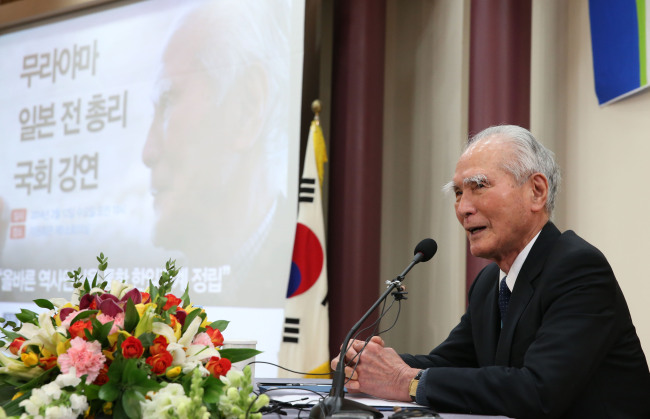‘Tokyo must resolve sex slavery dispute’
Japan’s ex-premier hopes Abe will honor his apology in 1995
By Korea HeraldPublished : Feb. 12, 2014 - 21:52

Japanese Prime Minister Shinzo Abe will honor the “Murayama statement,” former Japanese leader Tomiichi Murayama said Wednesday.
Speaking at Seoul’s National Assembly, Murayama said that his 1995 statement was of crucial importance to Korea-Japan relations, and would be upheld despite concerns over an increasingly right-wing Japanese government.
“Abe has stated that the Murayama statement will be upheld in the parliament. I respect (Abe’s) statement and believe that he will act accordingly,” Murayama said.
“In Japan, the entire population has the conviction that it (the statement) should be inherited. A Cabinet member who denies the statement needs to step down.”
In the 1995 statement, Murayama apologized for Japan’s wrongdoings in colonizing and waging war against other countries.
He added that in making the statement he was prepared to resign if it was rejected, and that the statement was of crucial importance to Korea-Japan relations as well as for Japan’s future.
While the statement is considered the cornerstone of Seoul-Tokyo relations, concerns have risen over its efficacy as Japanese politics moves increasingly rightward.
Describing the comfort women system as an “indescribable wrong,” Murayama also stressed the need to face historical issues.
“It is an indescribable wrong that took away the dignity of women. Japan needs to resolve it,” Murayama said in a speech at the National Assembly in Seoul.
“Comfort women” were women forced to work as sex slaves for the Japanese military during the 1930s and ’40s. The Japanese government denies its role in enslaving women.
Right-wing politicians and other public figures have also attempted to downplay the significance of the issue, comparing the victims to prostitutes.
“It is shameful that there are many who make various absurd remarks. The majority of the people (of Japan) realize that we committed a wrong.”
Saying that Korea-Japan discord was regrettable, Murayama stated that the two countries need to build a future-oriented relationship on top of a healthy understanding of historical issues.
Citing the Joint Declaration on a New Japan-Republic of Korea Partnership Towards the 21st Century of 1998, Murayama also called for cooperation between the two countries’ politicians.
“Politicians of the two countries should cooperate according to the principles of the joint declaration, and refrain from extreme words and actions to work together for building a future-oriented relationship,” Murayama said.
By Choi He-suk (cheesuk@heralcorp.com)
-
Articles by Korea Herald











![[Today’s K-pop] BTS pop-up event to come to Seoul](http://res.heraldm.com/phpwas/restmb_idxmake.php?idx=644&simg=/content/image/2024/04/17/20240417050734_0.jpg&u=)





![[KH Explains] Hyundai's full hybrid edge to pay off amid slow transition to pure EVs](http://res.heraldm.com/phpwas/restmb_idxmake.php?idx=652&simg=/content/image/2024/04/18/20240418050645_0.jpg&u=20240419100350)

![[Today’s K-pop] Zico drops snippet of collaboration with Jennie](http://res.heraldm.com/phpwas/restmb_idxmake.php?idx=642&simg=/content/image/2024/04/18/20240418050702_0.jpg&u=)